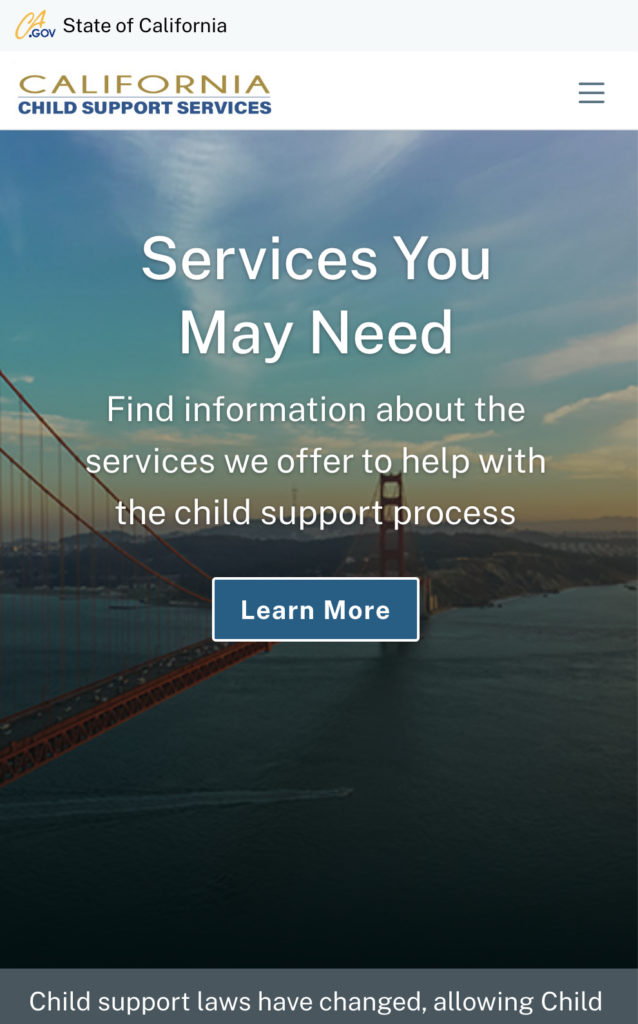Navigating the Complexities of Child Support in California
When parents separate or divorce in California, ensuring both contribute to their children’s needs is a top priority in family law. Enter child support—a court-ordered payment system designed to maintain the kids’ standard of living. But what happens when a parent fails to follow the child support order?
In this blog post, we’ll explore the ins and outs of child support enforcement in California. From determining support amounts to the consequences of non-payment, we’ll cover everything you need to know to navigate this complex process.
Understanding Child Support in California

The California Department of Child Support Services (DCSS) handles all matters related to child support enforcement. When parents separate or divorce, a judge may establish a child support order based on each parent’s income and the child’s needs. This legally binding order must be followed by both parents, regardless of their relationship status or personal circumstances
Basics of Child Support Calculation
In California, child support is calculated using the Income Shares Model, which considers both parents’ incomes and the amount of time the child spends with each parent. This model aims to ensure that the child receives the same level of financial support they would have if their parents were together.
The court also factors in the child’s specific needs and expenses, such as healthcare costs, educational expenses, and extracurricular activities. By taking a comprehensive approach to child support calculation, the court seeks to create an equitable arrangement that prioritizes the child’s well-being.
Factors Influencing Child Support Amounts
Several factors influence child support amounts in California, including:
- Each parent’s income: The court will consider both parents’ incomes, including salaries, wages, commissions, and other sources of income.
- Number of children and their special needs: The number of children requiring support and any special needs they may have will impact the support amount.
- Time each child spends with their parents: The court will consider the amount of time the child spends with each parent, as this can affect the allocation of expenses.
- Tax filing status and deductions: The court will also take into account each parent’s tax filing status and any relevant deductions that may impact their disposable income.
By carefully evaluating these factors, the court can determine a fair and appropriate child support amount that meets the child’s needs and reflects each parent’s financial ability to contribute.

Meet Family Law Lawyer
Catherine J. Navarro
Partner
Enforcing Child Support Orders in California
The DCSS plays a crucial role in ensuring children receive the financial support they need. They use various tools to enforce child support payments, including income withholding orders (IWOs) sent to the paying parent’s employer. The DCSS also works with the IRS and the Franchise Tax Board to intercept tax refunds, known as income tax refunds, when parents owe arrears.
Role of California’s Department of Child Support Services

The DCSS offers a range of services to help parents navigate the child support system, including:
- Locating non-custodial parents: If the whereabouts of the non-custodial parent are unknown, the DCSS can assist in locating them using various resources and databases.
- Establishing paternity: In cases where paternity is in question, the DCSS can help establish legal fatherhood through genetic testing or voluntary acknowledgment.
- Determining child support amounts: The DCSS can provide guidance on how child support amounts are calculated based on California’s guidelines and assist in establishing support orders.
- Enforcing child support payments: When a parent fails to make their required child support payments, the DCSS can employ various enforcement measures to ensure compliance.
In addition to these services, the DCSS provides resources for both custodial and non-custodial parents to help them understand their rights and responsibilities when it comes to child support.
By offering a comprehensive range of services, the DCSS aims to promote the financial well-being of children and families throughout California.
Wage Garnishment and Income Withholding: The Primary Tools
Wage garnishment and income withholding are the primary tools used by the DCSS to collect child support payments. An IWO is issued for every case where the paying parent is employed, instructing the employer to deduct the amount of the necessary child support payments from the parent’s paycheck and send it to the State Disbursement Unit (SDU).
This process ensures consistent and timely payments, reducing the risk of delinquency and minimizing the need for additional enforcement actions.
In cases where the paying parent is self-employed or receives income from sources other than traditional employment, the DCSS may use alternative methods to collect child support payments, such as issuing a direct income withholding order to the parent or pursuing other enforcement measures as necessary.
Other Enforcement Measures
In addition to wage garnishment and income withholding, the DCSS employs other enforcement measures:
- License Suspension: The DCSS can report delinquent parents to California licensing boards, potentially resulting in the denial or suspension of professional, business, or driver’s licenses.
This measure serves as a powerful incentive for parents to stay current on their child support payments, as the loss of a license can significantly impact their ability to work and earn income. - Passport Denial Program: Parents owing more than $2,500 in child support may be denied a passport or have their existing passport revoked. This enforcement tool prevents delinquent parents from traveling internationally until they address their outstanding child support obligations.
- Bank Levy: The DCSS can seize funds directly from financial accounts, including bank savings, retirement funds, and investments. By accessing these assets, the DCSS can recover past-due child support and ensure that the custodial parent receives the financial support they are entitled to.
- Property Lien: By placing a lien on real estate owned by the delinquent parent, the DCSS prevents the sale of the property without first satisfying the child support debt. This measure secures the child support obligation and ensures that the delinquent parent cannot avoid their responsibilities by transferring or selling assets.
- Credit Reporting: The DCSS can report overdue child support payments to credit agencies, negatively impacting the delinquent parent’s credit score. This consequence can make it more difficult for the parent to secure loans, housing, or other financial opportunities until they address their child support arrears.
- Unemployment Benefit Intercept: If a delinquent parent is receiving unemployment benefits, the DCSS can intercept a portion of those benefits to satisfy their child support obligations. This measure ensures that even during periods of unemployment, the custodial parent continues to receive financial support for the child.
While these enforcement measures can be powerful tools in compelling compliance with child support orders, the DCSS typically resorts to them only after other attempts to secure payment have been exhausted.
By working with parents to establish feasible payment plans and offering resources to help them meet their obligations, the DCSS aims to promote voluntary compliance and minimize the need for punitive actions.
Legal Consequences of Failing to Pay Child Support

Failing to pay child support in California carries serious legal consequences. Non-compliant parents may face contempt of court charges, civil penalties, and even criminal prosecution.
These consequences underscore the importance of taking child support obligations seriously and working to address any difficulties in meeting them promptly.
Contempt of Court Charges
When a parent willfully disobeys a child support order, they may be found in contempt of court.
The consequences can include jail time, civil penalties, and the requirement to pay the other parent’s legal fees and costs associated with enforcing the child support order.
In addition to these penalties, a finding of contempt can also result in a negative impact on the delinquent parent’s credit score, making it more difficult for them to secure loans or housing in the future.
Civil Penalties and Fines
In addition to contempt charges, delinquent parents may face civil penalties and fines:
- Civil penalties of up to 6% of the unpaid amount per month, capped at 72% of the total amount owed
- Fines imposed by the court to compel compliance with the child support order
- Reporting of overdue child support to credit agencies, negatively impacting the parent’s credit score
These financial consequences can add up quickly, making it even more challenging for delinquent parents to catch up on their child support obligations. By staying current on payments and addressing any difficulties promptly, parents can avoid these penalties and protect their financial well-being.
Criminal Prosecution for Non-Payment
In some cases, the willful failure to pay child support can result in criminal charges. A conviction may lead to up to one year in jail, fines of up to $2,000, or both.
To prove criminal non-support, prosecutors must show that the parent had the ability to pay but willfully failed to do so. This means that parents who are experiencing genuine financial hardship may have a defense against criminal charges, but they must take proactive steps to address their situation and communicate with the court and the DCSS.
Public defenders specializing in child support cases are available to assist those who cannot afford legal representation. By seeking legal guidance and working to address child support issues promptly, parents can minimize the risk of criminal prosecution and protect their rights and interests.
Modifying Child Support Orders in California
If either parent experiences a significant change in circumstances, they may request a modification of the child support order. Some common reasons for modification include changes in income, parenting time, or the child’s needs.
By allowing for modifications, the California child support system recognizes that families’ circumstances can change over time and provides a mechanism for ensuring that support orders remain fair and appropriate.
Circumstances That Warrant Modification
There are several circumstances that may warrant a modification of a child support order in California:
- Substantial increase or decrease in either parent’s income: If either parent experiences a significant change in their income, such as a job loss, promotion, or change in employment status, they may be eligible for a modification of the child support order.
- Changes in the child’s primary residence or the time spent with each parent: If the child’s living arrangements change, such as a shift in custody or visitation schedule, this may impact the allocation of expenses and necessitate a modification of the support order.
- Significant increases in the child’s needs, such as medical expenses or educational costs: If the child develops new or increased needs, such as ongoing medical treatment or enrollment in a special education program, the court may modify the support order to ensure these expenses are adequately covered.
Either parent has the right to request a review of the child support order to ensure it remains fair and appropriate given the current circumstances.
By staying informed about the modification process and seeking guidance when necessary, parents can ensure that their child’s needs are met and that support orders reflect their current financial realities.
The Process for Requesting a Modification
To request a modification of a child support order in California, parents must follow these steps:
- Complete the necessary court forms, such as an Answer to the Complaint, and file them with the court. These forms can be obtained from the local child support agency or the court clerk’s office.
- Attend the scheduled court hearing, where a judicial officer will review the evidence and arguments presented by both parties. Parents should come prepared with documentation supporting their request for modification, such as proof of income changes or increased expenses.
- The judicial officer will determine if a modification in child support is warranted based on factors such as changes in income, custody arrangements, and the child’s best interests. If a modification is granted, the court will issue a new child support order reflecting the updated terms.
Consulting with a family law attorney can help parents understand their rights and obligations and ensure that they are adequately prepared for the modification process. An experienced attorney can also help parents navigate any challenges or disputes that may arise during the process and protect their interests.
Protecting the Rights of Both Parents

Child support enforcement in California aims to protect the rights of both the custodial and non-custodial parents.
Custodial parents rely on child support payments to meet the child’s financial needs, while non-custodial parents have the right to maintain a relationship with their child and contribute to their upbringing.
By balancing the needs and interests of both parents, the California child support system seeks to create a fair and equitable arrangement that prioritizes the well-being of the child.
Ensuring Fair Access and Responsibilities
Child custody arrangements and parental rights play a vital role in ensuring fair access and responsibilities in child support enforcement. The court considers factors such as the child’s best interests, each parent’s ability to provide for the child, and the relationship between the child and each parent when determining custody.
By carefully evaluating these factors, the court can create a custody arrangement that allows both parents to maintain a meaningful relationship with the child while also ensuring that the child’s needs are met. This may involve joint custody, where both parents share physical and legal custody of the child, or sole custody with visitation rights for the non-custodial parent.
Family support programs and services are available to assist parents in providing for their children’s needs, promoting the well-being and development of children in California. These programs can offer financial assistance, parenting education, and other resources to help families navigate the challenges of separation and divorce.
Resolving Visitation and Custody Disputes
When visitation or custody disputes arise, resources such as mediation and family law facilitators can help parents reach a resolution that serves the best interests of the child.
Mediation is a process where a neutral third party helps parents communicate and negotiate a mutually acceptable agreement regarding custody and visitation. This can be a less adversarial and more cost-effective alternative to litigation, allowing parents to maintain control over the outcome and tailor the arrangement to their family’s unique needs.
Family law facilitators are court-based professionals who provide free assistance to parents involved in family law matters, including child support and custody. They can help parents understand their rights and obligations, complete necessary forms, and navigate the court process.
Maintaining a strong co-parenting relationship and open communication can help prevent and resolve conflicts related to child support and custody. By prioritizing the child’s well-being and working together to address challenges, parents can create a stable and supportive environment for their children, even in the face of divorce or separation.
Resources for Parents
California offers a variety of resources to help parents navigate the child support enforcement process:
Dept. of Child Support Services (DCSS)
The DCSS is responsible for overseeing the enforcement of child support orders in California. They provide services such as establishing paternity, locating non-custodial parents, and enforcing support payments.
Parents can contact the DCSS customer contact center for assistance and information regarding their child support case. The DCSS website also offers a wealth of resources and information on child support services, including online tools for applying for services and managing cases.
Family Law Facilitators
Family Law Facilitators work within the family law court system to provide support and guidance to parents involved in child support cases. They can assist with completing forms, providing information about court procedures, and offering guidance on support payments and related issues.
Family Law Facilitators are available in every county in California and offer their services free of charge. They can be an invaluable resource for parents who are navigating the child support system on their own and need assistance understanding their rights and obligations.
Bottom Line
Understanding child support enforcement in California is essential for ensuring the well-being of children following a separation or divorce. By familiarizing yourself with the process of calculating support, enforcing orders, and seeking modifications when necessary, you can help create a stable and nurturing environment for your child.
Remember, failing to meet your child support obligations can result in serious legal consequences. If you have questions or need assistance, don’t hesitate to reach out to the Department of Child Support Services or consult with a family law professional.
By fulfilling your child support responsibilities, you are investing in your child’s future and laying the foundation for their success.
Frequently Asked Questions
Q: How often can child support orders be reviewed in California?
A: In California, the rules say that child support agreements can be checked from time to time. This is done to make sure they still match up with how much money each parent makes and what the kid needs. The State Disbursement Unit (SDU) has all the details on how you can get this review started. If a parent’s income changes a lot or if there are other big reasons, they can ask for their child support order to be looked at again to see if they qualify for a change in the amount of child support in their existing order.
Q: What to do if the other parent refuses to pay child support?
A: When one parent won’t pay child support, the parent taking care of the kids has ways to deal with it. They can ask for help from the child support agency or take things to court by filing a contempt action. Doing this could lead to some tough outcomes for the parent who’s not paying, like having their wages taken directly from their paycheck, losing their license, or in some cases, facing serious consequences such as jail time.
Q: Can back child support be forgiven in California?
A: Generally speaking, in California, if someone hasn’t paid child support, it’s not something that can just be wiped clean. Even when the kid grows up and becomes an adult, the parent who was supposed to get the support money can still go after what they’re owed. But there are some special cases where maybe those missed payments or back child support might be adjusted or forgiven, including reporting to credit bureaus. To figure out how this works for a particular case, talking with a lawyer or getting in touch with the agency that handles child support could really help clear things up.
Q: How to report a violation of child support orders?
A: When someone doesn’t follow a child support order, it’s really important to let the right people know. In California, you can tell either the Department of Child Support Services (DCSS) or the court that made the support order about this issue. It helps a lot if you can provide proof and details of what went wrong so that they can take proper steps to fix things.
By getting answers to common questions, parents will find it easier to deal with issues related to child support in California. This way, they make sure their kids’ needs are looked after properly.
